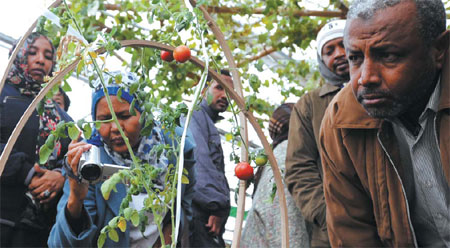Agri cooperation must be 'sustainable'
|
Teachers from the University of Khartoum in Sudan visit an ecological agricultural park in Taizhou, Jiangsu province, in December 2010. Luo Zhongming / Xinhua |
Sound and sustainable agricultural cooperation between China and African countries should be based on a win-win formula, according to a senior expert.
"Besides agricultural investment and technology support, China should help more African countries develop their industrial chains in the agricultural sector as an important way to increase local farmers' income," said Jiang Heping, a professor at the Chinese Academy of Agricultural Sciences.
Future agricultural cooperation between the two should focus on improving the processing and selling of agricultural products, he said.
Chinese agriculture professionals say they are attracted by the huge variety of African products, and they could provide added scope to the future development of new types of crops, he added.
"Although none of Africa's original seed sources has been used to grow agricultural products in China, the continent's rich seed resources will surely be useful to China in the future," he said.
Jiang, who is in his mid-50s, won the Fourth China-Africa Friendship Award in December. A fellow recipient at the awards was Yuan Longping, the agricultural expert widely known as the father of hybrid rice.
The award, initiated by the Chinese People's Association for Friendship with Foreign Countries in 2006, commends individuals and groups from China and Africa who have made an outstanding contribution to promoting Sino-African friendship.
Most past Chinese winners were medical workers sent from China to Africa, and Jiang and Yuan became the first agricultural experts to be recognized by the evaluation committee.
Jiang has been to Africa 16 times, visiting 12 countries, and said that China is now a contributor to the local agricultural sector.
Since the 1950s, China has dispatched nearly 10,000 agricultural technicians to Africa and built more than 240 agricultural projects, according to the Ministry of Agriculture.
Between 2009 and 2011, 16 Chinese agricultural technology teams have been sent to 13 countries where agriculture plays a significant role in the local economy.
Experts from the teams have trained 874 African agricultural technicians during the period, said the Ministry of Foreign Affairs.
In 2009, the Chinese government announced plans to establish 20 agricultural technology demonstration centers in Africa, double the number in an original plan.
For instance, the average harvest of hybrid rice in an agricultural technology demonstration center set up by China in Tanzania now is as much as 9 to 10 metric tons a hectare, compared with a yield of 1.95 tons a hectare with local rice breeds.
China's Ambassador to Tanzania Lu Youqing said last year that after severe drought and famine in the Horn of Africa in 2011, food security in the continent must be considered one of the world's top concerns.
"I believe, that with the promotion of China's rice planting technology, Tanzania's historical reliance on imported rice will come to an end in the near future," he said.
The involvement of the Chinese government in Africa through bodies such as the Food and Agriculture Organization of the United Nations also remains important.
In 2008, China announced it will contribute $30 million to the FAO to support developing countries, including African countries, to improve their agricultural productivity.
In 2012, with a UK investment of 10 million pounds ($15.2 million) combined with Chinese expertise, a four-year program was launched to facilitate the transfer of agricultural technology to low-income countries in Africa and Asia.
A good example of the kind of work being carried out by Chinese companies in the African agricultural sector is by Longping High-Tech Agriculture Co Ltd, which has trained people in various countries.
Zhang Ke, a foreign aid project manager with Longping, said the training involved many crop varieties, such as hybrid corn and vegetables as well as rice.
The company had also helped with crop processing and storage, and techniques involved in correct seed choice for specific climate conditions.
jinzhu@chinadaily.com.cn



















